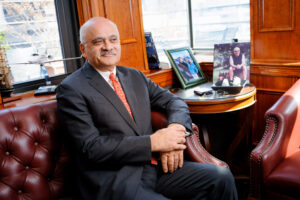Bharat Bhisé is a first-generation American, living in three continents over the last 40 years. Over the last several decades he has developed a unique skill set negotiating complex trans-border transactions, especially in Asia.
Currently, Bharat Bhisé lives in New York City with his wife, Swati. Bharat has a Bachelor of Commerce (Hons) degree from Shriram College, Delhi University; an MBA with distinction in International Business and Corporate Finance from Willumstad School, Adelphi University; and an Advanced Professional (PhD. without dissertation) from The Stern School, New York University in International Finance.
Bharat Bhisé has been an investor and portfolio manager in global transportation, leasing and logistics industries with significant experience in Private Equity, Structured Finance, and M&A. He has deep knowledge of logistics supply chains, especially in Asia, complemented with aviation and marine financing techniques with related Board experience for numerous years. He has managed $40 billion in transportation finance businesses including aircraft leasing, ship leasing, container leasing, trailer leasing, and various other related assets.
Bravia Capital was founded by Bhisé in 2000 initially as an advisory firm to Boeing Capital and Israel Aircraft Industries. It then rapidly became a provider of capital first into China, and then after the global financial crisis in 2008, M&A out of China. Since 2008, Bravia has acted as an originator, structuring agent, and financier for numerous transactions including two de-listings of NYSE companies. It has purchased world-class companies and management from blue-chip counterparties including G.E. Bharat Bhisé served on 6 major operational Boards as the primary non-management Director with executive authority. Today, Bravia serves as a single-family office that oversees the Bhisé’s portfolio of investments.
We recently had the opportunity to sit down with Bharat Bhisé where he shared how he got started and what has made him successful.
How did you get started?
After finishing college in India my father made some calls and helped introduce me to people he know at the Birla Group. I started in their subsidiary company GMMCO which was in construction and mining equipment. I didn’t do very much beyond going to various government offices and finding out what sort of plans they had to buy equipment, and then I would write a report. It was very similar to a sales job but for construction and earth moving equipment.
I then came to the United States for my MBA and got s job as a computer department assistant and a bar back at the local pub.
After my MBA, I worked with a United States company related to Matsushita in their Accounting department. The person who ran their European office died unexpectedly and I was asked to go to Paris to manage the entire department.
I then moved back to India temporarily as my now wife was living there. At this time I worked for Vijay Mallya, promoting his Black Dog Whiskey brand.
Following this stint in India, I returned to the United States and started my own company which traded foreign debt in El Salvador and Costa Rica. I was approached about leasing a plane to Laksa Airlines in Costa Rica (eventually taken over by TACA) — despite knowing nothing about the aviation business.
Needing a plane, I called Frank Lorenzo (the owner of Eastern Airlines) around 5:15pm (knowing the secretaries had left for the day). He answered and I convinced him to lease us the plane. This is how I got started in the aviation business.
I eventually ran Smith Wilson’s aviation portfolio before working for George Soros’ aircraft leasing fund, CS Aviation.
What inspired you to start Bravia Capital?
Since I didn’t have equity in CS Aviation, I left the company to start my own business. Two of my customers, Boeing and IAI, were willing to back me in this venture, where we specialized in freighter conversions. I was off to a good start but 9/11 was a huge setback for me and the aviation industry. I then spent a few years commuting between London and New York running Heavy Lift Airlines.
Around 2003, I started doing deals in aircraft financing with HNA Group Co., Ltd., a Chinese company based in Hainan, China. This continued until the 2008 financial crisis when I decided to create Bravia Capital, as a private equity firm focused not just in aviation — but also transportation and logistics.
How do you make money?
I make money by being able to align the key stakeholders in any business. This includes owners and shareholders, management, vendors, and customers. If 3 of those 4 are aligned, then you have a good business model.
I would try to see which parts weren’t aligned and would address those. For example, when I presided over a large aircraft leasing merger I fired my own incumbent management team. This included the CEO who is a good friend because the target company had better management in place.
When you were starting out, was there ever a time you doubted it would work? If so, how did you handle that?
I never had a doubt that I would succeed.
How did you get your first client?
My first clients were Boeing and Israeli International Airlines. I had done business with both of these companies previously while working for other companies. I sourced these from my Rolodex, and they were open to working with me at my own shop.
What do you think it is that makes you successful?
I believe success comes from a good mix of hard work and luck. I believe that I have had a great deal of the latter.
Who is the one entrepreneur to be your greatest example and inspiration? Why?
Fred Smith, the founder of FedEx, who invented the package business. In 1981, nobody thought that anyone would pay $12 for a package to be delivered the next day when you could do it for $.07 4 days later. He predicted the downfall of the US Postal Service.
I modeled my entire business career through understanding transportation costs from point A to point B.
Read more:
An Interview with Bharat Bhisé on the Success of Bravia Capital
















